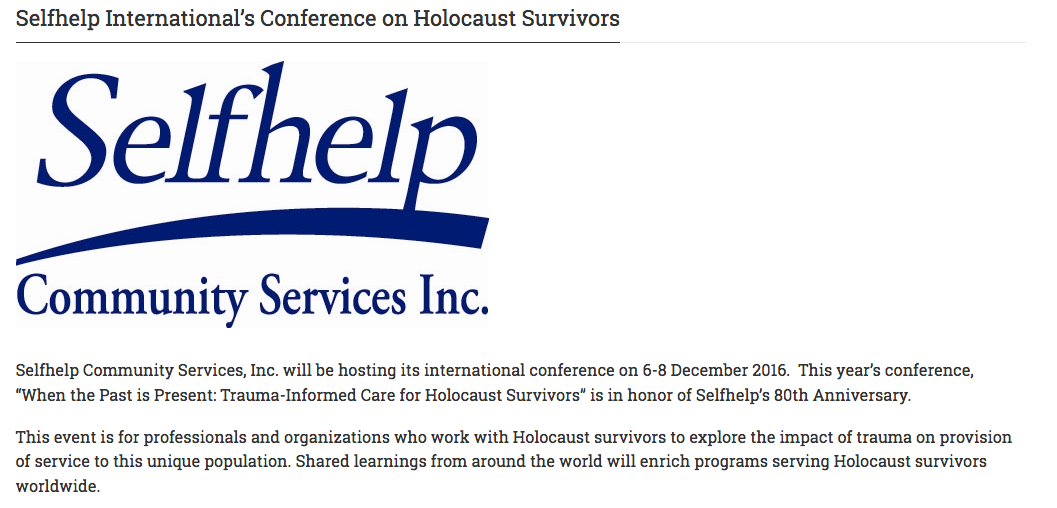On Thursday, December 8th at 11:30 I will be presenting a talk titled “Trauma Informed Care of Holocaust Survivors: Dehumanization and Empathy” at the SelfHelp International Conference about Holocaust Survivors, NYC. More information about the conference can be found at http://globalageing.org/event/selfhelp-internationals-conference-on-holocaust-survivors/.

Individuals with experiences of trauma are found in multiple service sectors, but they are even more likely than others to need behavioral services and medical services due to the psychological and physical burden that trauma places on individuals. Extensive research has documented the relationships among exposure to traumatic events and subsequent chronic physical or behavioral health disorders. Furthermore, research has shown that prior trauma might be associated with premature aging and cognitive impairment in older age. Thus there is a particular need for providers to be aware of the effects of trauma in the life of aging patients, clients and residents of nursing homes.
The very institutions and service systems that are intended to provide services and supports to individuals are often themselves trauma-inducing. Medical settings in particular have been shown to be potentially traumatizing due to specific parameters, which will be elucidated, that increase the risk of non-intentional dehumanization of patients. Empirical findings support the perturbing conclusion, as stated by Haque and Waytz (2012) that “Dehumanization is endemic in medical practice.” (p. 75). Such dehumanization is not conscious and has been shown to be manifested even in well-intentioned professionals dedicated to the care of others. Dehumanization represents non-conscious, unintentional emotional bias that occurs even in individuals who consciously uphold humane, egalitarian values.
The presentation will describe recent insights from research of neuro- social cognitions and will elaborate on the relevance of these findings to clinical practice. Dehumanized perceptions are automatic, rapid social categorization processes that are rooted in the evolution of the human species. The need for swift reactions to threats from the physical environment and the imperative to be able to immediately differentiate between friend and foe served our ancestors well when humans lived in isolated tribes. These categorization processes no longer serve us well in the multi-ethnic societies we live in, and in the modern institutional settings in which care is provided to people.
There is now an increased emphasis on the impact of trauma and on how service systems must be cognizant of trauma in order to appropriately care for their clients and patients, and in order to avoid re-traumatizing those service recipients who are trauma survivors. These issues are of particular relevance to the treatment of aging Holocaust survivors in all service providing settings, including medical settings, nursing homes, and even to those receiving services to remain in their homes. Home-health care aids are not necessarily informed about the Holocaust, the impact of trauma on aging patients, its impact on the relationships between them and the patient, and about the need to consider the trauma in adjusting practices with this particular group of trauma survivors.
The presentation will provide practical insights, informed by research about neuro-social cognitions, as to how to counteract automatic emotional biases which increase the risk of dehumanization and reverse these processes in clinical practice.
Irit Felsen

Leave a Reply